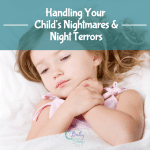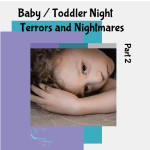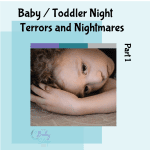
As a parent, you’ve probably had some experience with your baby or toddler waking in the middle of the night. And if you’ve read many of our Baby Sleep Site® blog articles or free guides, you’ve likely learned a lot about what can cause night waking: sleep associations, hunger, teething, illness, schedule problems, etc.
Here’s a night-waking cause that catches many parents of toddlers by surprise, however: nightmares and night terrors. Starting around 18 months, your toddler may start to wake at night not out of habit, or because she’s hungry or sick, but because she’s scared. And these nightmares and night terrors can continue well into the preschool and school years, too.
So, what causes nightmares and night terrors? When do they start? And what’s the difference between them? That’s the topic of an article series that we’re presenting over the next two weeks. This week, we’ll look specifically at nightmares and how to deal with them. Next week, we’ll examine night terrors and examine how they’re different than nightmares.
Your Toddler’s or Preschooler’s Nightmares: When They Start and Why They Happen
As we adults know from experience, a nightmare is simply a scary dream. Often, nightmares start as normal, non-threatening dreams and then take a frightening turn.
No one knows for certain when nightmares begin. Our babies aren’t articulate enough to tell us if they’ve had a bad dream. We do know, however, that dreams and nightmares occur during the active stage of sleep, known as REM (Rapid Eye Movement) sleep. Babies experience REM sleep just like we adults do. (In fact, babies experience far more REM sleep than adults do!) So it’s possible that a baby – even a newborn – can experience dreams and nightmares.
It may be helpful to note that a person’s REM cycles get longer as the night progresses. A child’s first REM cycle is fairly short (10 minutes or so), but each subsequent REM cycle is longer. The last cycle being close to an hour long. For this reason, most people (children and adults alike) tend to have their dreams or nightmares in the second half of the night.
Evidence of nightmares can be seen as early as one year old, although as Nicole has written in a previous article about nightmares, many parents don’t see any evidence of nightmares until their toddler is a bit older:
Since a one-year old can’t talk or express himself that well, it’s hard to know just how complex his dreams are, but by two years old, when the imagination has really started to come alive, nightmares can get very specific. However, at this age, although they might understand a nightmare is just a dream and have an idea about what a dream is, when he wakes up, he might not fully understand the dream is over and still remain scared for a bit later.
As your child gets older, the understanding between dream and reality will get better and by 5 years old, she will have a much bigger grasp of the difference between dream and reality. Even when your child is older, it doesn’t mean the dreams won’t be scary, but they may not always need you to come for help (which I’m sure is a bittersweet feeling!)
There’s no definitive cause of nightmares, but there are certain problems or situations that may make a toddler or preschooler more prone to nightmares. These include:
- Illness (many children are prone to nightmares when they have fevers.)
- Overtiredness (children who are overly exhausted have more nightmares than children who are well-rested.)
- Having irregular sleep routines (a lack of a bedtime routine can make nightmares more prevalent.)
- Developmental milestones (children may be more prone to nightmares around the times that they’re conquering a developmental step, like learning a new skill.)
- Stress or anxiety (outside circumstances – like a move, or the birth of a new sibling – may cause your toddler or preschooler anxiety, which can in turn cause nightmares)
- A traumatic event (if your toddler or preschooler has experienced something traumatic, he may have repeated nightmares after the event.)
Nicole’s Note:
“I have found that my eldest son gets more nightmares when he’s too hot while he sleeps. All year round I am trying to perfect the temperature in his room, what pajamas he wears, and whether I turn the fan on or not. It’s a little maddening, to be honest! :)”
How to Deal With Your Toddler’s or Preschooler’s Nightmares
You won’t know your toddler or preschooler has even had a nightmare, of course, unless she tells you about it. And remember that your child can have nightmares that even she won’t remember.
However, you’ll probably experience the occasional middle-of-the-night waking when your toddler or preschooler does have a nightmare. When that happens, you need to be ready to help her through her fears. Keep the following in mind as you work to comfort your toddler or preschooler after a nightmare:
- Your child’s fear is real. The events of your little one’s nightmare may be fictional, but his fear isn’t. Respect your toddler’s or preschooler’s feelings. Offer plenty of comfort and reassurance. Physical reassurance is especially good. Offer plenty of hugs!
- Don’t add to your child’s fear by overreacting. If your child wakes crying and afraid in the middle of the night, it’s perfectly understandable for you, the parent, to feel anxious and upset as well. However, remember that your toddler or preschooler takes many of her cues from you. So if you seem upset, it’ll only make your child more upset. If you’re able to remain calm and fairly neutral, however, it’ll go a long way towards helping your child feel reassured and relaxed. This principle applies to many other aspects of your toddler’s or preschooler’s life, too — including separation anxiety. If your child wakes from a nightmare, try singing a song together, or reading a book (this one about nightmares is great!), or simply cuddling.
- Cutesy techniques may work, but they can also backfire. Some parents have luck with techniques like “magical monster spray” (child sprays a bit of lavender-scented water at bedtime, to ward off monsters), or doing monster hunts around the room (to prove to the child that no monsters are lurking). And these certainly can work. However, be aware that these methods can also backfire because they play along with your child’s notion that monsters and scary creatures actually exist. In some cases, it can be better to simply remind your child frequently that monsters aren’t real. Assure your little one that nothing in their room can hurt them.
- Be wary of causing any long-term habits in response to a short-term problem. We preach this quite a bit here at The Baby Sleep Site®. It applies here as well. Don’t try to “fix” a short-term problem by helping your child to develop bad sleep habits. If you want to bring your toddler or preschooler into your bed after a bad dream, or if you want to climb into his bed with him, that’s your decision. (And doing it on occasion probably won’t do any harm.) But that can quickly become a regular thing. Toddlers tend to develop bad sleeping habits quickly, and those habits can be hard for parents to break.
Be mindful of the solutions you’re using to solve your toddler’s or preschooler’s nightmare problems. Make sure they’re solutions that won’t cause any long-term issues. You want to read our recent article from Dr. Kaylene Henderson for some additional tips on how to handle toddler fears and bedtime monsters.
If your toddler or preschooler struggles with night terrors, be sure to check out Part Two of our Nightmares & Night Terrors series.








